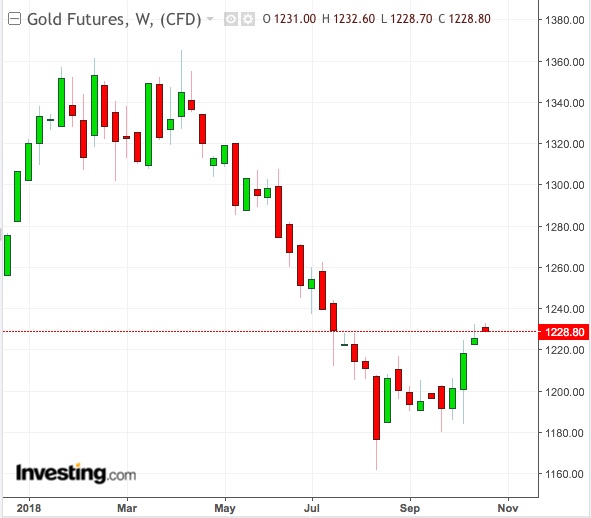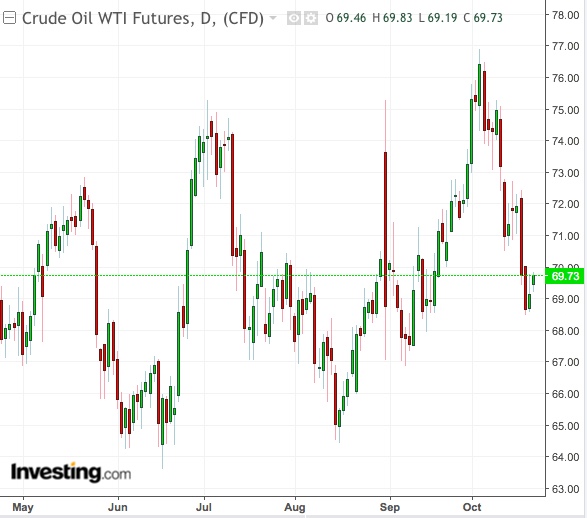An important driver in commodity markets this week will be the question of what is the geopolitical premium for oil, if any, as determined by the Saudi Kingdom's alleged complicity in the murder of journalist Jamal Khashoggi.
Historical correlations between crude and political uncertainties—especially those involving a producer as big and important as Saudi Arabia—show a barrel’s pricing can jump one to two dollars in the immediate outbreak of a crisis and maintain an upward bias until further clarity emerges on how supply-demand will be affected longer-term.
Oil’s rally in recent months on the US decision to reimpose sanctions on Iran is one such example.

If oil prices break higher this week on the Saudi political scandal, gold could also advance toward the $1,250 per ounce target as more institutional buyers see the yellow metal as a safe haven versus political troubles, as well as a hedge against inflation and the dollar.
Forceful US Action On Saudis Doubted
But geopolitics aside, commodity markets have also shown in the past that the economy ultimately decides all prices, and oil is no exception, despite being the raw material that literally powers and moves the world.
Analysts say for oil prices to spike with a force that would send Brent back into the high $80s and US crude beyond the mid-$70s—about 8 percent higher than current levels—the United States would have to apply sanctions on Riyadh that would threaten some 7 million barrels per day in Saudi crude exports.

But there seems no immediate threat of that happening, with the Saudis likely to draw out any investigations on the Khashoggi slaying in order to not implicate any intelligence service senior officials, or the Kingdom's leadership, in particular Crown Prince Mohammad bin Salman at the end. The Trump Administration has also dithered in the past week on the possibility of taking meaningful action against Riyadh.
Economic Data Likely To Decide Action
In the vacuum left by such geopolitical inaction, global economic indicators would come to the fore. Second quarter growth in China and the eurozone slowed slightly from a year ago. And while the US economy outperformed in the same period by expanding 4.2 percent year-on-year, third quarter GDP this Friday is expected to show growth of only 3.3 percent growth.
Other data likely to keep investors on the edge this week include French, German, eurozone manufacturing and services PMI, eurozone services PMI, US durable goods orders and US pending home sales—with all readings expected to show a slowdown.
Such data could be bearish for industrial commodities such as copper and cotton and risk adding pressure on oil, with the US Energy Information Administration (EIA) expected to announce a fifth straight weekly rise in domestic crude inventories this week.
Attention To Turn To Oversupply Potential
Adam Sarhan, founder and CEO of New York-based global capital markets fund 50 Park Investments, said:
“There’s no economic justification to prompt a major spike in oil prices now other than fear over what the Iranian and Saudi crises could turn into.”
“If these things blow over and it’s ‘business as usual’, then very quickly we’ll go back to the real worries in oil and that’s overpricing, oversupply and signs of even more supply coming.”
Dominick Chirichella, director of risk management and trading at the Energy Management Institute in New York, shares that view somewhat. He said attention on the Iranian sanctions has declined over the past couple of weeks, replaced by talk of another potential oil glut in the making.
Recent reports by the EIA, OPEC and the West’s energy watchdog IEA have all indicated comfortable and growing supplies for oil. US oil services firm Baker Hughes, meanwhile, has reported the US oil rig count at 3-1/2 year highs, indicating more drilling for crude.
Despite such worries of oversupply, Chirichella stresses that security concerns in energy cannot be totally allayed, given the many geopolitical factors to watch now. For oil, it would chiefly be the Middle East, which he says “remains unstable, with a high level of uncertainty over the Saudi killing”.
Oil prices opened steadily in Asia on Monday, with the fallout from the Khashoggi affair not representing an immediate factor. But that could change later in the week, if not later in the day.
